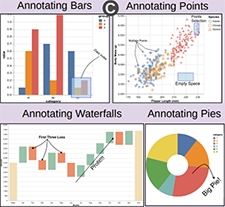Annogram: An Annotative Grammar Of Graphics Extension

|
Annogram: An Annotative Grammar Of Graphics Extension |
Abstract
Annotations are central to effective data communication, yet most visualization tools treat them as secondary constructs — manually defined, difficult to reuse, and loosely coupled to the underlying visualization grammar. We propose a declarative extension to Wilkinson’s Grammar of Graphics that reifies annotations as first-class design elements, enabling structured specification of annotation targets, types, and positioning strategies. To demonstrate the utility of our approach, we develop a prototype extension called Vega-Lite Annotation. Through comparison with eight existing tools, we show that our approach enhances expressiveness, reduces authoring effort, and enables portable, semantically integrated annotation workflows.
Downloads
Citation
Md Dilshadur Rahman, Md Rahat-uz- Zaman, Andrew M McNutt, and Paul Rosen. Annogram: An Annotative Grammar Of Graphics Extension. IEEE VIS Short Papers, 2025.
Bibtex
@article{rahman2025annogram,
title = {AnnoGram: An Annotative Grammar of Graphics Extension},
author = {Rahman, Md Dilshadur and Zaman, Md Rahat-uz- and McNutt, Andrew M and Rosen,
Paul},
journal = {IEEE VIS Short Papers},
year = {2025},
abstract = {Annotations are central to effective data communication, yet most
visualization tools treat them as secondary constructs -- manually defined, difficult to
reuse, and loosely coupled to the underlying visualization grammar. We propose a
declarative extension to Wilkinson's Grammar of Graphics that reifies annotations as
first-class design elements, enabling structured specification of annotation targets,
types, and positioning strategies. To demonstrate the utility of our approach, we
develop a prototype extension called Vega-Lite Annotation. Through comparison with eight
existing tools, we show that our approach enhances expressiveness, reduces authoring
effort, and enables portable, semantically integrated annotation workflows.}
}

